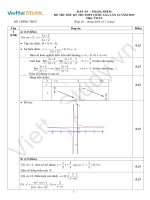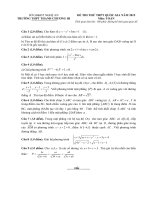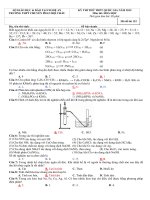- Trang chủ >>
- Thạc sĩ - Cao học >>
- Luật
Tải Đề thi thử THPT Quốc gia năm 2017 môn Tiếng Anh trường Đại học Ngoại Thương, Hà Nội (Lần 5) - Đề thi thử Đại học 2017 môn Tiếng Anh có đáp án
Bạn đang xem bản rút gọn của tài liệu. Xem và tải ngay bản đầy đủ của tài liệu tại đây (563.01 KB, 5 trang )
<span class='text_page_counter'>(1)</span><div class='page_container' data-page=1>
TRƯỜNG ĐH NGOẠI THƯƠNG
VIỆN KINH TẾ & THƯƠNG MẠI QUỐC TẾ
<b>KÌ THI TRUNG HỌC PHỔ THƠNG QUỐC GIA </b>
<b>NĂM 2017 </b>
<b>Mơn: TIẾNG ANH – THI LẦN 5 (07/5/2017) </b>
<i>Thời gian làm bài: 60 phút, không kể thời gian phát đề </i>
<b>Họ và tên:……… </b>
<b>Mark the letter A, B, C or D on your answer sheet to indicate the word whose underlined part </b>
<b>differs from the other three in pronunciation in each of the following questions. </b>
<b>Question 1: A. Christ </b> <b>B. Christen </b> <b>C. Christian </b> <b>D. Christmas </b>
<b>Question 2: A. naked </b> <b>B. sacred </b> <b>C. cowshed </b> <b>D. hatred </b>
<b>Mark the letter A, B, C or D on your answer sheet to indicate the word which differs from the other </b>
<b>three in the position of primary stress in each of the following questions. </b>
<b>Question 3: A. deficiency </b> <b>B. psychology </b> <b>C. ecological </b> <b>D. competitor </b>
<b>Question 4: A. mature </b> <b>B. nature </b> <b>C. culture </b> <b>D. measure </b>
<b>Mark the letter A, B, C or D on your answer sheet to indicate the underlined part that needs </b>
<b>correction in each of the following questions. </b>
<b>Question 5: In advanced stages of anorexia, the patient is unable to feed him. </b>
<b>A </b> <b>B </b> <b>C </b> <b>D </b>
<b>Question 6: In my opinion, I think the problem should be solved as soon as possible. </b>
<b>A </b> <b>B </b> <b>C </b> <b>D </b>
<b>Question 7: We were short of money, therefore we decided not to eat out that weekend. </b>
<b>A </b> <b>B </b> <b>C </b> <b>D </b>
<b>Mark the letter A, B, C or D on your answer sheet to indicate the correct answer to each of the </b>
<b>following questions. </b>
<b>Question 8: Linguists have discovered that Nostratic and proto-Indo-European have many words in </b> .
<b>A. relation </b> <b>B. affinity </b> <b>C. common </b> <b>D. conjunction </b>
<b>Question 9: If no one </b> misbehaving, all pupils will be kept in after school.
<b>A. admits off </b> <b>B. admits in </b> <b>C. owns up in </b> <b>D. owns up to </b>
<b>Question 10: Their flat is decorated in a </b> combination of colors.
<b>A. tasteful </b> <b>B. sweet </b> <b>C. delicious </b> <b>D. tasty </b>
<b>Question 11: I seem to be </b> in energy this morning.
<b>A. low </b> <b>B. short </b> <b>C. lack </b> <b>D. bereft </b>
<b>Question 12: I would like to thank you, </b> my colleagues, for the welcome you have given us.
<b>A. on account of </b> <b>B. on behalf of </b> <b>C. because of </b> <b>D. instead of </b>
<b>Question 13: She wondered </b> her father looked like then, after so many years away.
<b>A. how </b> <b>B. whose </b> <b>C. what </b> <b>D. that </b>
<b>Question 14: The police car drove into the car park and </b> sharply.
<b>A. pulled in </b> <b>B. pulled up </b> <b>C. pulled aside </b> <b>D. pulled about </b>
<b>Question 15: We are going to have a meeting </b> the morning of December 21st<sub>. </sub>
<b>A. at </b> <b>B. in </b> <b>C. on </b> <b>D. to </b>
<b>Question 16: A native speaker of Spanish, for example, will </b> to learn than a native speaker of
Chinese
<b>A. find Portuguese much easier </b> <b>B. find that Portuguese is much easy </b>
<b>C. find Portuguese much easy </b> <b>D. find Portuguese is much easier </b>
<b>Question 17: Your fare, accommodation and meals, are all </b> in the price of this holiday.
<b>A. composed </b> <b>B. collected </b> <b>C. enclosed </b> <b>D. included </b>
<b>Question 18: We will leave for the airport </b> he is ready.
<b>A. while </b> <b>B. during </b> <b>C. until </b> <b>D. as soon as </b>
<b>Question 19: Nothing is destroyed after the serious flood in this area, </b> ?
<b>A. is it </b> <b>B. isn’t it </b> <b>C. aren’t they </b> <b>D. are they </b>
</div>
<span class='text_page_counter'>(2)</span><div class='page_container' data-page=2>
<b>Question 20: This is my last portable CD player. I'll let you have it for fifty dollars. " </b> "
<b>A. Could you give me a discount? </b> <b>B. Could you possibly give me fifty dollars? </b>
<b>C. Could you give me your last CD? </b> <b>D. Can you tell me your favorite type of music? </b>
<b>Question 21: "How far is the train station?" " </b> "
<b>A. Approximately two miles long. </b> <b>B. About ten minutes away. </b>
<b>C. Quite slow, I think. </b> <b>D. It's really fast, isn't it? </b>
<b>Mark the letter A, B, C or D on your answer sheet to indicate the word or phrase CLOSEST in </b>
<b>meaning to the underlined word or phrase in each of the following questions. </b>
<b>Question 22: Many young children are spending large amounts of time watching the TV without being aware of </b>
<b>its detriment to their school work. </b>
<b>A. harm </b> <b>B. advantage </b> <b>C. support </b> <b>D. benefit </b>
<b>Question 23: The aircraft carrier is indispensable in naval operations against sea or shore based enemies. </b>
<b>A. unique </b> <b>B. novel </b> <b>C. exotic </b> <b>D. vital </b>
<b>Mark the letter A, B, C or D on your answer sheet to indicate the word or phrase OPPOSITE in </b>
<b>meaning to the underlined word or phrase in each of the following questions. </b>
<b>Question 24: They have not made any effort to integrate with the local community. </b>
<b>A. cooperate </b> <b>B. put together </b> <b>C. separate </b> <b>D. connect </b>
<b>Question 25: Mr. Smith’s new neighbors appear to be very friendly. </b>
<b>A. amicable </b> <b>B. inapplicable </b> <b>C. hostile </b> <b>D. futile </b>
<b>Mark the letter A, B, C or D on your answer sheet to indicate the sentence that is closest in </b>
<b>meaning to each of the following questions. </b>
<b>Question 26: It is not until a Vietnamese girl getting 18 years old that she is allowed to get married legally. </b>
<b>A. A Vietnamese girl is not allowed to get married legally only when she gets 18 years old. </b>
<b>B. They never allow a Vietnamese girl to get married legally when she is 18 years old. </b>
<b>C. The legal allowance for a Vietnamese girl to get married will be issued in 18 years. </b>
<b>D. A Vietnamese girl is allowed to get married legally only when she gets 18 years old. </b>
<b>Question 27: As soon as he approached the house, the policeman stopped him. </b>
<b>A. No sooner had he approached the house that the policeman stopped him. </b>
<b>B. Hardly had he approached the house when the policeman stopped him. </b>
<b>C. No sooner had he approached the house when the policeman stopped him. </b>
<b>D. Hardly he had approached the house that the policeman stopped him. </b>
<b>Question 28: Is anyone checking your essay about the environmental pollution? </b>
<b>A. Are you having your essay about the environmental pollution checked? </b>
<b>B. Are you checking your essay about the environmental pollution? </b>
<b>C. Are you going to check your essay about the environmental pollution? </b>
<b>D. Are you having someone to check your essay about the environmental pollution? </b>
<b>Mark the letter A, B, C, or D on your answer sheet to indicate the sentence that best combines each </b>
<b>pair of sentences in the following questions. </b>
<b>Question 29: Vietnam exports a lot of rice. It is grown mainly in the south of the country. </b>
<b>A. Vietnam exports a lot of rice which grown mainly in the south of the country. </b>
<b>B. Vietnam exports a lot of rice, that is mainly grown in the south of the country. </b>
<b>C. Vietnam exports a lot of rice grown mainly in the south of the country. </b>
<b>D. Vietnam, which is grown mainly in the south of the country, exports a lot of rice. </b>
<b>Question 30: He behaved in a very strange way. That surprised me a lot. </b>
<b>A. His behaviour was a very strange thing, that surprised me most. </b>
<b>B. He behaved very strangely, which surprised me very much. </b>
<b>C. What almost surprised me was the strange way he behaved. </b>
<b>D. I was almost not surprised by his strange behaviour. </b>
<b>Read the following passage and mark the letter A, B, C or D on your answer sheet to indicate the </b>
<b>correct word or phrase that benefits each of the number blanks from 31 to 35. </b>
</div>
<span class='text_page_counter'>(3)</span><div class='page_container' data-page=3>
Generally, this expression of thoughts and feelings had been in the form of oral (31) . When there is
a language (32) , communication is accomplished through sign language in which motions stand for
letters, words, and ideas. Tourists, the deaf, and the mute have had to (33) to this form of
expression. Many of these symbols of whole words are very picturesque and exact and can be used
internationally, spelling, however, cannot.
Body language transmits ideas or thoughts (34) certain actions, either intentionally or
unintentionally. A wink can be a way of flirting or indicating that the party is only joking. A nod signifies approval,
while shaking the head indicates a negative reaction.
Other forms of nonlinguistic language can be found in Braille (a system of raised dots read with the
fingertips), signal flags, Morse code, and smoke signals. Road maps and picture signs also guide, warn, and
instruct people.
(35) verbalization is most common form of language, other systems and techniques also
express human thoughts and feelings.
<b>Question 31: A. address </b> <b>B. speech </b> <b>C. utterances </b> <b>D. claims </b>
<b>Question 32: A. barrier </b> <b>B. obstacle </b> <b>C. division </b> <b>D. separation </b>
<b>Question 33: A. refer </b> <b>B. rotate </b> <b>C. resort </b> <b>D. revolve </b>
<b>Question 34: A. on </b> <b>B. from </b> <b>C. of </b> <b>D. by </b>
<b>Question 35: A. While </b> <b>B. As </b> <b>C. Because </b> <b>D. However </b>
<b>Read the following passage and mark the letter A, B, C or D on your answer sheet to indicate the </b>
<b>correct answer to each of the following questions from 36 to 42. </b>
<b>Carbon dating can be used to estimate the age of any organic natural material; it has been used </b>
successfully in archeology to determine the age of ancient artifacts or fossils as well as in a variety of other
<b>fields. The principle underlying the use of carbon dating is that carbon is a part of all living things on Earth. </b>
Since a radioactive substance such as carbon-14 has a known half-life, the amount of carbon-14 remaining in an
object can be used to date that object.
Carbon-14 has a half-life of 5,570 years, which means that after that number of years, half of the
carbon-14 atoms have decayed into nitrogen-14. It is the ratio of carbon-14 in that substance that indicates the
age of the substance. If, for example, in a particular sample the amount of carbon-14 is roughly equivalent to
the amount of nitrogen-14, this indicates that around half of the carbon-14 has decayed into nitrogen-14, and
the sample is approximately 5,570 years old.
Carbon dating cannot be used effectively in dating objects that are older than 80,000 years. When
objects are that old, much of the carbon-14 has already decayed into nitrogen-14, and the miniscule amount
that is left doesn’t provide a reliable measurement of age. In the case of older objects, other age -dating
methods are available, methods which use radioactive atoms with longer half-lives than carbon has.
<b>Question 36: This passage is mainly about </b> .
<b>A. the differences between carbon-14 and nitrogen-14 </b>
<b>B. one method of dating old objects </b>
<b>C. archeology and the study of ancient artifacts </b>
<b>D. various uses for carbon </b>
<b>Question 37: The word “it” refers to </b> .
<b>A. carbon dating </b> <b>B. the age </b>
<b>C. any organic natural material </b> <b>D. archeology </b>
<b>Question 38: Which of the following is NOT true about carbon-14? </b>
<b>A. It is radioactive. </b>
<b>B. Its half-life is more than 5,000 years. </b>
<b>C. It can decay into nitrogen-14. </b>
<b>D. It and nitrogen always exist in equal amounts in any substance. </b>
<b>Question 39: The word “underlying” could best be replaced by </b> .
<b>A. below </b> <b>B. requiring </b>
<b>C. being studied through </b> <b>D. serving as a basis for </b>
<b>Question 40: It can be inferred from the passage that if an item contains more carbon-14 than nitrogen-14, </b>
then the item is .
</div>
<span class='text_page_counter'>(4)</span><div class='page_container' data-page=4>
<b>C. too radioactive to be used by archeologists </b> <b>D. more than 5.570 years old </b>
<b>Question 41: It is implied in the passage that </b> .
<b>A. carbon dating could not be used on an item containing nitrogen </b>
<b>B. fossils cannot be age-dated using carbon-14 </b>
<b>C. carbon-14 does not have the longest known half-life </b>
<b>D. carbon dating has no known uses outside of archeology </b>
<b> Question 42: The paragraph following the passage most probably discusses . </b>
<b>A. how carbon-14 decay into nitrogen-14 </b>
<b>B. various other age-dating methods </b>
<b>C. why carbon-14 has such a long half-life </b>
<b>D. what substances are part of all living things </b>
<b>Read the following passage and mark the letter A, B, C or D on your answer sheet to indicate the </b>
<b>correct answer to each of the following questions from 43 to 50. </b>
Rachel Carson was born in 1907 in Springdale, Pennsylvania. She studied biology in college and zoology at
Johns Hopkins University, where she received her master’s degree in 1933. In 1936, she was hired by the U.S.
Fish and Wildlife Service, where she worked most of her life.
Carson’s first book,
Under the Sea Wind
, was published in 1941. It received excellent reviews, but saleswere poor until it was reissued in 1952. In that year she published
The Sea around Us
, which provided afascinating look beneath the ocean’s surface, emphasizing human history as well as geology and marine biology.
Her imagery and language had a poetic quality. Carson consulted no less than 1,000 printed sources. She had
voluminous correspondence and frequent discussions with experts in the field. However, she always realized the
limitations of her nontechnical readers.
In 1962, Carson published
Silent Spring
, a book that sparked considerable controversy. It proved how much<b>harm was done by the uncontrolled, reckless use of insecticides. She detailed how they poison the food supply </b>
of animals, kill birds and fish, and contaminate human food. At the time, spokesmen for the chemical industry
<b>mounted personal attacks against Carson and issued propaganda to indicate that her findings were flawed. </b>
However, her work was proved by a 1963 report of the President’s Science Advisory Committee.
<b>Question 43: The passage mainly discusses Rachel Carson’s work . </b>
<b>A. as a researcher </b> <b>B. at college </b>
<b>C. at the U.S. Fish and Wildlife Service </b> <b>D. as a writer </b>
<b>Question 44: It can be inferred from the passage that in 1952, Carson’s book </b>
Under the Sea Wind
.
<b>A. was outdated </b> <b>B. became more popular than her other books </b>
<b>C. was praised by critics </b> <b>D. sold many copies </b>
<b>Question 45: Which of the following was NOT mentioned in the passage as a source of information for </b>
The Sea
around Us
?<b>A. Printed matter </b> <b>B. Talks with experts </b> <b>C. A research expedition D. Letters from scientists </b>
<b>Question 46: Which of the following words or phrases is LEAST accurate describing </b>
The Sea around Us
?<b>A. Highly technical </b> <b>B. Poetic </b> <b>C. Fascinating </b> <b>D. Well researched </b>
<b>Question 47: The word “reckless” is closest in meaning to . </b>
<b>A. unnecessary </b> <b>B. irresponsible </b> <b>C. continuous </b> <b>D. limited </b>
<b>Question 48: According to the passage, </b>
Silent Spring
is primarily .<b>A. an attack on the use of chemical preservatives in food </b>
<b>B. a discussion of the hazards insects pose to the food supply </b>
<b>C. a warning about the dangers of misusing insecticides </b>
<b>D. an illusion of the benefits of the chemical industry </b>
<b>Question 49: Which of the following is closest in meaning to the word “flawed”? </b>
<b>A. faulty </b> <b>B. deceptive </b> <b>C. logical </b> <b>D. offensive </b>
<b>Question 50: Why does the author of the passage mention the report of the President’s Science Advisory </b>
Committee?
<b>A. To provide an example of government propaganda </b>
<b>B. To support Carson’s idea </b>
</div>
<span class='text_page_counter'>(5)</span><div class='page_container' data-page=5></div>
<!--links-->









